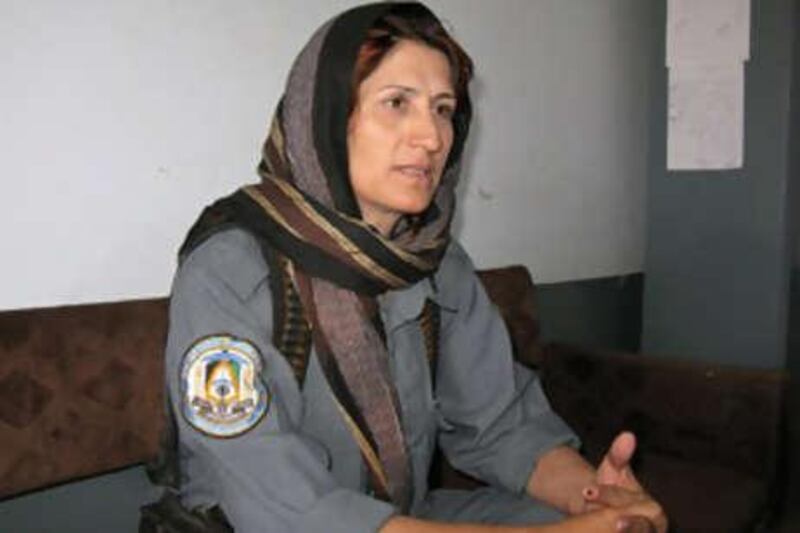The most prominent policewoman in Afghanistan was assassinated yesterday, the latest victim of the Taliban insurgency's deliberate campaign of violence against Afghans associated with the fragile reconstruction of the country. Lt Col Malalai Kakar was shot by gunmen outside her home in Kandahar city as she left for work early yesterday. Mrs Kakar, a mother of six, was a 25-year veteran of the police force and head of the department of crimes against women in Kandahar. Her 15-year-old son was also wounded. Her job in Afghanistan's most conservative province, which is in the grip of an insurgency quickly spreading to the rest of the country, made her all the more remarkable and a nationally respected figure.
A spokesman for the Taliban, Ahmed Yousef, claimed responsibility for the murder, AFP news agency reported. "We killed Malalai Kakar. She was our target, and we successfully eliminated our target," he said. Mrs Kakar, believed to be in her early 40s, became a national legend when she killed three would-be assassins in a shoot-out 25 km west of Kandahar, which is also a haven for drug traffickers. Yesterday, members of parliament expressed their sorrow and said her death represented a setback for the cause of women. "We feel a great loss," said Fawzia Kofi, an MP, speaking by telephone from Kabul. "Malalai was quite different because she was working for the police in a risky area. "She knew the risks, but wanted to contribute and bring peace and the rule of law."
Hamid Karzai, the president, condemned the attack, saying in a statement that it was an act of "cowardice" by the "enemies of the peace and welfare and reconstruction of Afghanistan". Members of Afghan civil society, government and security forces such as doctors, journalists and police are targets of Taliban insurgents or extremists associated with the jihadist cause. They receive death threats usually in the form of so-called night letters warning them not to work with foreigners.
Mrs Kakar, who strapped a bandolier of bullets on her five-foot frame every morning before leaving for work, regularly received letters at her home but shrugged them off. In the past six months alone, 700 police officers have been killed. In June, another female police officer, Bibi Hoor, 26 was killed by gunmen on motorcycles in Herat, a western province. Mrs Kofi said the ministry of interior had a campaign to encourage more women to join the police force across the country, but it was difficult persuading families to allow their daughters to do so because of cultural restrictions and security problems. "Malalai was very well-known, and she was a role model," she said. "As head of the department of crimes against women, if there were issues of rape, domestic violence she investigated it. This is a huge job because domestic violence is very common."
There are only a few hundred women who have signed up to join the police, which suffers from rampant corruption. Mrs Kakar was among 11 policewomen in Kandahar. The 80,000-strong force is being built with money and expertise from the West, which makes it a particular target of the Taliban. Mrs Kakar joined the force in the early 1980s with the encouragement of her father and brothers, who were also police officers. When the Taliban came to power in 1996 she ran an underground girls' school, but when it was discovered she fled to Pakistan with her husband and children. In 2001, she returned to Kandahar and resumed her job. She also signed up to the police and became its first female graduate.
She arrested female criminals, ran the women's prison and accompanied male colleagues on drug raids or stakeouts to suspected Taliban enclaves. She searched the female quarters of houses where traffickers or insurgents hid arms and money. Although she expressed her dislike of the burqa, she wore it for work and once showed up for an interview wearing one with a fully loaded AK-47 assault rifle concealed underneath the garment. "It is good for disguising my identity when I'm doing an investigation," she said. But her duties were also like those of a family counsellor. Girls forced into marriage or men seeking a divorce would seek her help. She was known for a typically dark Afghan humour. In 2004 she arrested a woman because her lover had tried and failed to kill the woman's husband with a knife. "She should have made sure her lover had a sharper knife," she said. During a stakeout with more than a dozen male colleagues near a suspected Taliban hideout, the police found themselves overwhelmed by the extremist fighters and abandoned the scene. Mrs Kakar was among a handful who stayed on to fight. Later, she publicly shamed the policemen. "You have long moustaches, but no bravery," she said. The police force frequently find themselves overwhelmed by well-armed insurgents who are offered up to US$700 (Dh2,600) a month to hit targets associated with the central government in Kabul. By contrast, most Afghan police officers are paid about $60 a month. Wazhma Froug, a women's rights activist, said the assassination was part of a wider campaign on the part of the Taliban to discourage women from leaving their homes. hghafour@thenational.ae * With additional reporting by the Associated Press





